Vitamin B12 Is Crucial for Red Blood Cells Production

Vegetables and fruit are rich in vitamins, except the one and only B12. What is vitamin B12, what benefits does it have, and how to avoid its deficiency: we answer all these and numerous other questions.
Vitamin B12: Health Benefits
Also known as cobalamin, this most chemically complex of all vitamins is required for the production of red blood cells (RBCs).
What’s more, this compound is also crucially important for the health of nerve tissues and proper brain function, including the ability to think. The body also uses it for the creation and regulation of DNA, protection of eyes from macular degeneration, and production of energy.
Anemia Prevention
If left untreated, the inadequate level of vitamin B12 leads to anemia. As we breathe oxygen into the lungs, red blood cells capture it and deliver it to all cells of the body. Without enough cobalamin, the human organism cannot produce the normal quantity of RBCs, so all tissues experience a continual lack of oxygen. Symptoms of anemia include pale skin, tiredness, weakness, headache, joint pain, and memory weakness.
Energy Production and Cognitive Function
Vitamin B12 is required for converting food into energy; if your body doesn’t have enough of it, you might feel sluggish and weak. What’s more, it is also used for the synthesis of myelin, a protective covering of nerves. Thus, a lack of cobalamin might impair cognitive function.
Vitamin B12 Benefits for Skin and Hair
Sometimes cobalamin deficiency manifests itself via such symptoms as skin hyperpigmentation, partial or total loss of skin pigmentation, hair changes, and skin lesions. Such symptoms are not specific to vitamin B12 deficiency alone, which often complicates the matter. Still, in some cases supplements with this compound might improve the health of your skin.
Recommended Daily Intake and Food Sources
The recommended daily intake of cobalamin is 2.4 mcg. It can only be found in animal food like meat, eggs, milk, fish, etc. These sources greatly differ in the quantity of cobalamin they contain:
- Milk: contains 0.3-0.4 mcg per 100 grams
- Egg: 0.9-1.4 mcg/100 grams
- Meat: 3 mcg/100 grams
- Fish: from 3 to 9 mcg/100 grams
- Turkey: 33 mcg/100 grams
- Cooked beef liver: 83 mcg/100 grams
Varying Bioavailability
Cooking leads to decomposing of a part of cobalamin in the food. Keep in mind that the bioavailability of the compound (the amount that can be absorbed by the body) varies between foods:
- Nearly a third of the compound in meat is destroyed by cooking and usually only 66% of the remaining amount are absorbed;
- Boiling leads to the loss of nearly 30% of the compound in milk;
- The bioavailability of the compound in fried eggs is only 9.2% — and this figure is even less for all other egg recipes.
Groups of Risk
There are several groups of people with elevated risks of vitamin B12 deficiency:
- The first — and the largest — group who might develop cobalamin deficiency are the elderly: the production of stomach acid declines as people get older, and cobalamin is no longer freed from the food;
- Vegetarians and vegans limit animal food in their diet: this means that their intake of vitamin B12 might be inadequate;
- People who suffer from genetic inabilities (including celiac disease and Crohn’s disease) to absorb the compound from food sources might also have significantly lower quantities of it in their bloodstream;
- People who have atrophic gastritis and those who underwent stomach or intestinal surgery;
- People who have reduced secretion of gastric acid and pepsin because they need to take such drugs as cimetidine, esomeprazole, famotidine, lansoprazole, nizatidine, omeprazole, pantoprazole, rabeprazole, and ranitidine;
- People who suffer from diabetes and need to take metformin.
All these groups are advised to regularly take dietary supplements that contain cobalamin.
Pregnancy and Nursing
The European Food Safety Authority recommends that pregnant women receive at least 4.5 mcg of cobalamin per day and that nursing women take as much as 5 mcg of it every day. Thus, it is recommended that during these crucial periods of their lives women use supplements with vitamin B12 or a complex of vitamins. The benefits of such an approach might be enormous.
Dietary Supplements with Vitamin B12: Benefits and Side Effects
In severe cases of pernicious anemia, a condition when the body lacks the intrinsic factor that is required for cobalamin absorption, the only available way to get vitamin B12 benefits is through injections.
However, in most cases, regular oral intake of dietary supplements is enough. These supplements greatly differ in their forms and dosing: there are sprays (including nasal ones), gels, and sublingual preparations, as well as regular pills and capsules.
One of the very first effects of the supplements that people who suffer from cobalamin deficiency experience is added energy. This effect led to a popular misconception that large doses of cobalamin will help you feel more energetic; some people even try to use vitamin B12 benefits for weight loss.
Unfortunately, if your cobalamin levels are normal, you are unlikely to feel an energy surge. It is also doubtful that this compound alone will help you get slim: you need a balanced diet and regular physical exercise as well.
Cobalamin is water-soluble; it is excreted from the bloodstream via urine. Even large doses of it do not have any toxic effect on the human body, so you don’t have to worry about overdosing.
Where to Buy Vitamin B12 Supplements
Famous for its excellent reputation and affordable prices, iHerb is one of the most popular online dietary supplement stores. Here are some of the supplements you can buy on iHerb:
Sublingual Methylcobalamin from Solgar
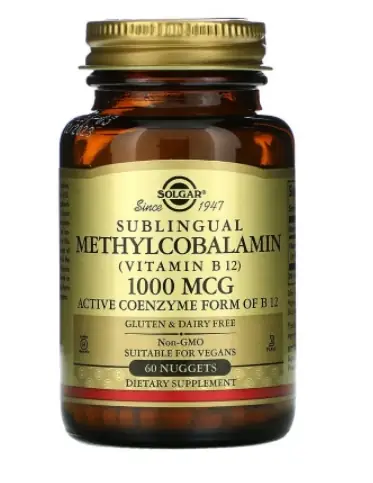
- Reputable brand
- Sublingual nuggets
- Methylcobalamin is the active form of cobalamin that can immediately be used by the body
- 1000 mg per nugget
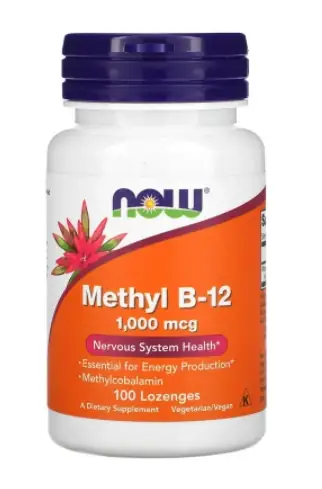
- A well-known brand that combines high quality with affordability
- Highly bioavailable methylcobalamin
- Chewable lozenges
- 1000 mg per lozenge
Methyl B12, Methyl Folate, and Vit. B6 from Jarrow Formulas
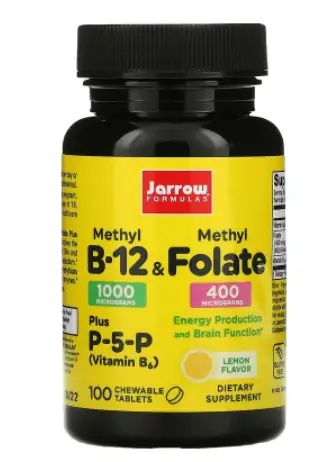
- Reputable brand
- Methylcobalamin + methyl folate (a highly bioavailable form of vitamin B9) + P-5-P (a highly bioavailable form of vitamin B6)
- Chewable tablets
- 1000 mcg per tablet
B-12 Organic Spray from Garden of Life
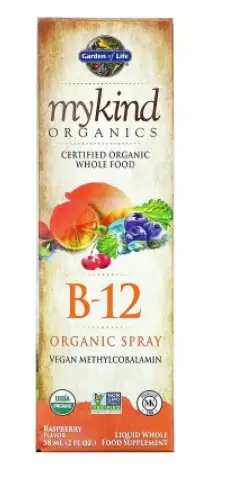
- Kids-friendly and easy-to-use form of vitamin B12
- Benefits for the elderly and people who have trouble swallowing
- 500 mcg of methylcobalamin per dose
- No artificial flavors used
- Sweetened using stevia, no sugar added
- Certified organic
Liposomal Spray from NOW Foods
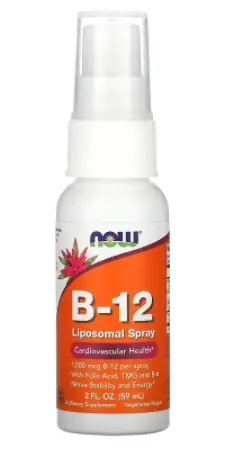
- Affordable yet trustworthy brand
- Advanced liposomal form: molecules of vitamins are placed inside a protective liposomal container
- Cyanocobalamin + folate (folic acid, B9) + B6
- 1000 mcg of cyanocobalamin per dose
What is vitamin B12 and what benefits it offers — now you know the exact answers to these questions. Stay healthy!